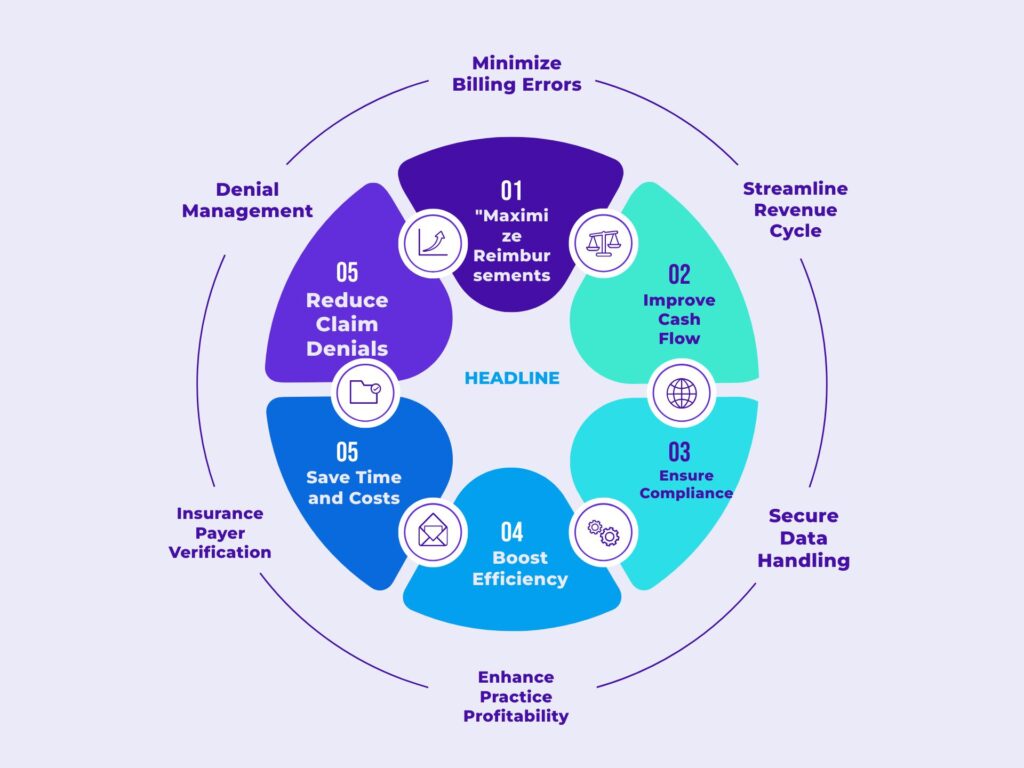A vital part of the healthcare sector, medical billing has a direct impact on healthcare providers’ cash flow. Internal resources may be severely strained by the intricacy of handling administrative duties, processing claims, and adhering to constantly shifting regulations. Consequently, a lot of healthcare providers are using medical billing outsourcing as a way to boost overall revenue cycle management, cut expenses, and increase efficiency.
What is Medical Billing Outsourcing?
The practice of healthcare providers hiring outside businesses to manage their medical billing and coding duties is known as medical billing outsourcing. From patient data entry and coding to claim submission, payment follow-ups, and appeals of denied claims, these specialized organizations handle it all. Healthcare facilities can increase their operational efficiency by outsourcing these duties so they can concentrate more on patient care rather than administrative duties.

The Value of Medical Invoicing
The process of medical billing is heavily regulated and requires precision, adherence, and promptness. It involves a number of procedures, including coding patient services, filing insurance claims, and making sure that payments are made on time. Any mistake can cause claims to be denied or payments to be delayed, which would disrupt the flow of revenue.
Outsourcing medical billing gives healthcare organizations the know-how they need to efficiently handle these procedures, lowering errors and guaranteeing steady income.
The main advantages of outsourcing medical billing
Costs Reduction
The decrease in operating expenses is among the biggest benefits of outsourcing medical billing. The expenses of buying and maintaining billing software are high, as are the costs of recruiting and training an internal billing staff. Because these overhead costs are borne by the third-party company, outsourcing enables healthcare providers to do away with them.
Better Revenue Cycle Management and Cash Flow
A smooth revenue cycle is guaranteed by effective medical billing. Third-party billing firms focus on minimizing claim denials, cutting down on delays, and submitting claims on time. Better cash flow can be maintained by healthcare organizations with quicker payments and fewer errors. Additionally, outsourcing lowers the likelihood of rejections by guaranteeing that claims are coded accurately from the beginning.
Technology and Expertise Availability
Healthcare providers can access highly skilled billing professionals who are knowledgeable about the most recent coding standards and industry regulations by outsourcing medical billing. Furthermore, outsourcing partners make use of cutting-edge billing software to guarantee regulatory compliance.
Want to know how to medical billing outsourcing is helpful?
Flexibility and Scalability
Healthcare organizations’ billing requirements change as they expand. Without having to invest in new software or hire more employees, medical billing outsourcing gives providers the freedom to scale their services to meet their needs.
Pay attention to your core competencies
Healthcare providers can refocus on their core competency of patient care by outsourcing administrative duties like billing and coding. Better patient outcomes and fewer distractions for medical personnel are guaranteed by a well-run billing system.
Managing High Overhead Costs in In-House Billing
Presents Difficulties
It takes a large investment in software, staff training, and infrastructure to run an internal billing department. These expenses can mount up over time, making it challenging for healthcare providers to stay profitable.
Regulatory and Compliance Risks
Medical billing is subject to strict regulations, and it can be difficult to stay in compliance with coding standards like ICD-10 and healthcare laws like HIPAA (Health Insurance Portability and Accountability Act). Internal billing departments might find it difficult to keep up with changing rules, which could result in non-compliance issues.
Errors in Billing and Refusals of Claims
The revenue of a healthcare provider can be significantly impacted by claim denials, which can result from even small billing errors. Internal teams might not have the resources or experience necessary to properly handle such problems.

The Operation of Medical Billing Outsourcing
First Consultation and Evaluation
The medical billing company and the healthcare provider consult before the outsourcing process starts. The billing process used by the provider is evaluated.
Integration and Transition
The transition phase starts as soon as the outsourcing agreement’s terms are finalized. The electronic health records (EHR) or billing software of the healthcare provider are integrated with the billing company’s systems. To guarantee a seamless transition, this phase’s essential components include data migration, employee training, and integrated system testing.
Processing and Monitoring Claims
The billing process is taken over by the outsourcing partner once the system has been integrated. They oversee claim submission, procedure coding, unpaid claim follow-up, and the resubmission of rejected claims. Frequent updates and reports
Selecting the Best Medical Billing Partner
Experience and Knowledge
It’s critical to evaluate a medical billing outsourcing partner’s industry experience before choosing them. A business that has experience working with healthcare providers of comparable sizes is probably better at handling the billing procedure.
Security and Compliance
Make sure the outsourcing provider is prepared to handle sensitive patient data securely and complies with all healthcare laws, including HIPAA. Security lapses can be expensive and harm the outsourcing partner’s and healthcare provider’s reputations.
Want to know how to revolutionize your Medical Billig Services?
Technology and Integration Skills
Advanced billing software and the capacity to interface with the healthcare provider’s current EHR or practice management systems are characteristics of the ideal outsourcing partner.
Prospects for Medical Billing Outsourcing in the Future
Enhanced AI and Automation
Automation and artificial intelligence (AI) are predicted to become more important in medical billing outsourcing as the healthcare industry continues to adopt technology. Data entry and other routine billing tasks can be handled by automated systems, which lowers human error and expedites the claims procedure.
Improved Analytics for Data
Medical billing companies are using advanced analytics tools to better understand the revenue cycle of healthcare providers. These tools can pinpoint areas for improvement, spot trends in claim denials, and streamline the billing procedure to boost revenue.
Services for Telehealth Billing
Billing firms are adjusting to the particular difficulties presented by virtual healthcare as telehealth services become more popular. Outsourcing providers must efficiently manage the coding and submission of these claims while also ensuring compliance with telehealth-specific billing regulations as telehealth becomes more popular.
Worldwide Outsourcing
Many healthcare providers are starting to consider outsourcing medical billing to foreign companies. Global outsourcing is a desirable choice for healthcare organizations on a tight budget because nations with lower cost of living can provide billing services at a reasonable price without sacrificing quality.
Advantages vs. Disadvantages of Medical Billing Outsourcing
| Advantages Disadvantages |
| Cost reduction Loss of control |
| Access to expertise Data security concerns |
| Improved cash flow Potential communication issues |
| Scalability Integration challenges |
| Focus on core competencies Dependence on third-party |
| Enhanced compliance Transitioning complexities |
In conclusion
Medical billing outsourcing has become a strategic option for providers seeking to optimize their operations and concentrate on patient care in an era of growing healthcare complexity. Healthcare providers can lower expenses, enhance revenue cycle management, and guarantee adherence to industry regulations by outsourcing billing tasks.
Medical billing outsourcing is anticipated to change in the future due to new developments in technology and emerging trends like telehealth billing. Healthcare companies will be well-positioned to prosper in the cutthroat healthcare market if they accept these changes and select the best outsourcing partners.
FAQs
Is outsourcing medical billing appropriate for both large hospitals and small clinics?
Yes, both large healthcare networks and small clinics can benefit from medical billing outsourcing. Large hospitals gain from the effective administration of intricate billing procedures, while smaller clinics can access the same degree of technology and experience without having to hire full-time employees thanks to the scalability of outsourcing services.
What are the upcoming developments in the outsourcing of medical billing?
The growing trend of global outsourcing to cut costs, improved data analytics for better revenue cycle insights, adoption of telehealth billing services, and the growing use of automation and AI to streamline billing processes are some of the major trends.
How is data security ensured by medical billing outsourcing?
To safeguard sensitive patient data, reputable medical billing outsourcing firms employ stringent security protocols, such as data encryption, safe data storage, and frequent audits. To protect patient data, these businesses also abide by data privacy regulations like HIPAA.
How much does it cost to outsource medical billing?
The size of the healthcare provider and the range of services needed determine how much medical billing outsourcing costs. The majority of outsourcing firms charge a fixed fee per processed claim or a percentage of the total amount of money received. Nevertheless, the savings from lower overhead and more effective billing frequently outweigh these expenses.

